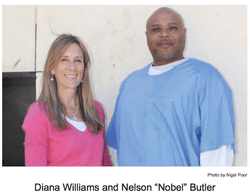But this was no traditional employment seminar: the job seekers are all inmates at Marin’s San Quentin State Prison, right in our backyard, and participants in the prison’s Employment Readiness Seminars, an eight-week curriculum that is designed to provide them with the essential skills and tools they need to find, and keep, a job after they are released from prison.
The curriculum was designed by Mill Valley resident Diana Williams, who began volunteering at San Quentin two years ago through the California Reentry Program and the Inside Prison Project. Williams has an M.A. in counseling psychology and was initially drawn to helping inmates with the social and emotional aspects of their predicament and the choices that led them to prison. “Interest in human beings has always been paramount in my life,” Williams says.
There was some unexpected momentum for programs like the Employment Readiness Seminars in 2015, as conservative power player Koch Industries surprised many by touting the need for bipartisan reform of the criminal justice system, putting forth a five-point plan that specifically mentioned the need to help youth and non-violent offenders re-enter the job market after their release.
Williams says that sort of support is crucial. “Jobs are the number one factor to prevent recidivism,” she says.
One of the unique elements of the San Quentin program is it’s origin. It’s the brainchild of Nelson “Nobel” Butler, a 46-year-old San Quentin inmate who was in the midst of the parole hearing process and wanted to know how to get a job because he has been incarcerated since he was 19 years old.
“Men in prison have no way of finding out how to get a job,” Butler, who met Williams through his participation in the inmate group TRUST (Teaching Responsibility, Utilizing Sociological Training), told the San Quentin Times.
The chance to meet with employers was the culmination of the Employment Readiness Seminars, which begin with a seemingly basic but critical question: what are my skills and interests? For many inmates, particularly those who’ve been in prison since they were young men, that’s a difficult question to answer, Williams says.
Chung Kao, 54, told the Times that the highlight of his training was doing an interest assessment. “It told me more accurately about myself than I could do about my own interests,” he says. “That stuff is very accurate if you follow it step by step.”
The curriculum also helps inmates present themselves to employers on resumes and cover letters, how and where to search for jobs, conducting themselves in interviews and, perhaps most importantly, how to keep and thrive in a new job.
“It’s a comprehensive job readiness curriculum that encourages the men to hold the highest vision for themselves and their futures,” Williams says. “It gives the men a jump start, since these are programs usually offered at career centers after they get out and the inmates get to meet employers while they are still incarcerated.”
Williams says several employers have told her that the men coming out of prison are often their best employees because there are things that the prison experience has honed in these men: discipline, the ability to work well with others and, most of all, patience.
“They are literally always waiting in line for everything, and they are grateful for the opportunity,” she adds.
The Employment Readiness Seminars will continue in the spring, and Williams is looking for more employers to participate, particularly in the job fair that concludes the program.
Williams said the labor shortage in the Bay Area, particularly in construction, presents a great opportunity for the inmates. And many of them have participated in apprenticeship programs within specific industries, so that they’ll leave prison with skills ready-made for jobs in construction, manufacturing, delivery services or landscaping.
“We make it a routine to hire people who have been incarcerated,” said Jesykah Forkash, one of the owners of Aaron Metals. “We want them to go from being a lifer in prison to being lifers with us.”
Williams says that while employers like Social Imprints have made it their social mission to train and hire former inmates, many others have done so quietly. Regardless, the impact is huge.
“To be in the midst of the men who are making huge changes in their lives and taking advantage of the programs of the prison – it is inspiring incredibly inspiring to be there and see how far men are willing to go and how far they are transforming themselves,” she says.
If you’re interested in connecting with Williams about participating in the Employment Readiness Seminars, email info@millvalley.org.

